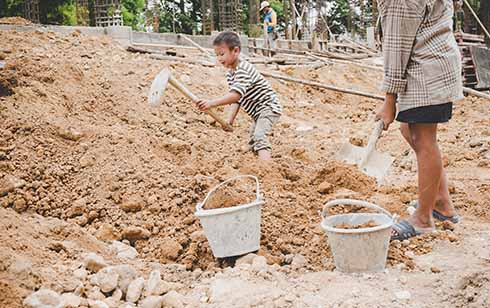 Nothing summons our outrage and compassion as strongly than the sight of children brutally treated. When we hear a story of a little child who is victim to neglect or domestic violence, is thrown into prison in Australia or made a child soldier in Africa, is deliberately shot by military at a demonstration in Myanmar or dies in a mine collapse in India, we see this event as more than just an incident. We feel that it calls out to heaven and earth for justice.
Nothing summons our outrage and compassion as strongly than the sight of children brutally treated. When we hear a story of a little child who is victim to neglect or domestic violence, is thrown into prison in Australia or made a child soldier in Africa, is deliberately shot by military at a demonstration in Myanmar or dies in a mine collapse in India, we see this event as more than just an incident. We feel that it calls out to heaven and earth for justice.
The International Days that remember innocent children who are victims of aggression (4 June) or of forced hard labour (12 June) make a claim on us when we meet adults who have survived childhood experiences to which no child should have been exposed.
Some years ago I met a young Burmese woman who had just been put into an Immigration Detention Centre. She spoke little English but asked everyone for pills – to end her life. Listening to her story, I could understand why. As a baby she had been sold across the border into Thailand. There she was used as a domestic slave until 12, when she was sold on to a locked clothing factory in the city, and some years later sold on again to a brothel. When she was seen as no longer useful she was sold on again to Malaysia, and finally to Australia, and finally dumped on the police in order to save a return fare.
Her story was one of outrage, but also one of compassion and resilience. An English teacher at the Detention Centre befriended her, pressed for her to be allowed to stay in Australia, housed her when she was accepted, and supported her when she began a Tafe course to begin a new life. Ironically, the detention centre, a symbol of Australian lack of respect for vulnerable people, was the first place where she had ever met people who showed her respect and love for who she was. It was the beginning of her flowering.
That story, with its movement from childhood rejection, enslavement, to exploitation, to rejection, and then to respect and possibility in her adulthood, illustrates clearly why the abusive treatment of children for other people’s profit is so appalling, and why neglected and abused children command our respect. Children who by definition have no achievements, no money of their own, no high skills, and have contributed nothing to society, show clearly that the value of all human beings does not depend on what they achieve or on their status, their wealth or their connections. It is based purely in their value as human beings. Each human being is precious and each demands respect.
The story says, too, that we may never give up on any human being or accept that children are enslaved or abused for the pleasure or profit of other human beings. We should notice, report and press for change in practices that deny children’s human dignity. Among these practices are the laws that allow children as young as eight years old to be imprisoned under criminal law, which Jesuit Social Services and many other groups are pressing to change. We know the harm they do. And we, too, have seen in the lives of the young people whom we accompany how much love and respect can heal gaping wounds and create new possibilities in human lives. As Jesus said, theirs is the kingdom of heaven.
REFLECTION QUESTIONS AND ACTIVITIES
Making good decisions and developing resilience – questions and activities
These classroom questions and activities explore making good decisions like the Good Samaritan and being resilient like Jesus. They also examine contemporary contexts, such as resilience through faith in sports and making good decisions on significant issues.